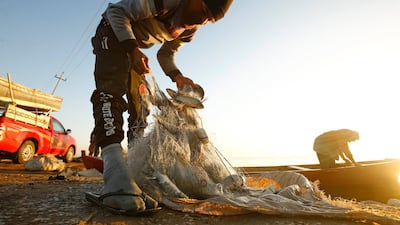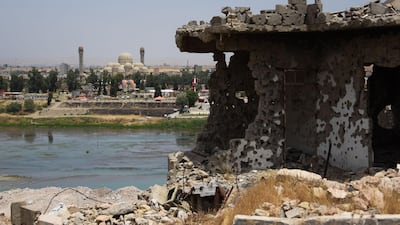Two young Iraqis have launched an online travel service on Facebook for foreigners intrepid enough to visit Iraq.
That might seem like a niche proposition – after all, the country still experiences ISIS attacks and occasional bouts of violence between international coalition forces and groups backed by Iran.
But large parts of Iraq remain safe enough to visit, especially for those with local knowledge, Iraqis and backpackers tell The National.
The online Travellers Cafe, established by Diyar Talal, 25, and Osamah Mousa, 32, both students, provides exactly that – local knowledge.
Set up to promote “global citizenship”, the forum has exploded in popularity and found a wide audience among those who want to see Iraq’s seemingly endless archaeological heritage and eye-catching landscapes, lush palm groves and barren desert.
“Travelling is not a goal but a means to gain lots of things," Mr Talal said. "Through it, a person can enrich their knowledge, improve their creativity in business and other fields. Our most important goal is helping people to accept others regardless of their background."
In less than two years, the group’s membership has swelled to more than 28,000.
Mr Talal is studying for a master’s degree student in computer science at Al Mustansiriyah University in Baghdad. In 2019 he launched the cafe but found himself alone, so he didn’t hesitate to share his idea with his friend.
“When I was in India studying, Diyar phoned me and expressed his willingness to become a co-founder of the Iraqi Travellers cafe. I agreed and once I came to Baghdad, we teamed up,” Mr Mousa said.

“I am a part of this world, I am not a local citizen but an international one who feels responsible for spreading peace through the global citizenship concept."
But the forum isn’t online only: Beban cafe in Baghdad is a comfortable place where Iraqi Travellers cafe members can meet.
Cafe manager Aziz is also a member of the Facebook group and offers a discount to group members to diversify his clientele.
Two of his customers, Luke Heater and his girlfriend Paulie, both passionate adventurers from the US in their 30s, showed up unannounced at the cafe.
“Coming to Iraq has been like cleaning up and purifying the soul. Iraqis, with their quiet dignity and strong sense of service to guests, have elevated my faith in people. It’s incredible,” said Paulie, an actress who lives in New York.
“In spite of all the media woes, Iraq is a marvel – the crown jewel being its people. They are generous, kind, eager to please and make foreigners feel at home.”
Mr Mousa offered Paulie and Luke a tour of the city, visiting Baghdad’s traditional cafes, steeped in local history, through the narrow alleys off Al Rasheed Street where antique souvenirs can be found.
Luke bought old currency featuring Saddam Hussein’s picture, as well as a statue of a donkey which because of its age was missing an ear.
Paulie was given a box of decades-old matches made in Iraq, a gift offered by an antique shop owner.
“We were told ‘generosity runs in Iraqi’s genes’ and it’s evident. The amount of people who come up and say ‘hello’, ask if we need help and welcome us into their homes gives a warm feeling,” said Luke, who describes himself as an American with a need for adventure.
Almost every country visited by Luke and Paulie has a wealth of knowledge online about travel, what to do on arrival and where to stay. But when they were researching travel in Iraq, all Luke could find was the Travellers Cafe.
“Without that group I can honestly say there’s a good chance I wouldn’t be here right now. I can’t thank them enough. I’ve met countless people from that group who have done nothing but make my trip stress-free, but most of all fun,” Luke said.
Drinking freshly pressed grape juice from Haj Zbala was only one top tip for Luke and Paulie.
Located in the heart of Baghdad on Al Rasheed Street, the shop was founded in 1900 and is beautifully decorated with hundreds of pictures of Iraqi politicians, singers, writers and Arab presidents, patrons going back to the Ottoman era when it was founded.
“There are pictures of all the politicians who have gone to the Haj Zbala shop since 1900. This was quite symbolic to me, I found that Iraqis are able to separate politics from people,” Paulie said.
As she was enjoying the juice, a Baghdadi man realised they were foreigners.
“When you come to our country, the home is yours and we will be your guests,” he said, paraphrasing an old Iraqi saying.
“I feel a need to document these adventures and show the world what Iraq has to offer. Oh, and the visa on arrival played a huge part in choosing Iraq as a destination,” says Luke, in reference to new Iraqi government regulations that have improved the previously cumbersome visa application process.
“Our meetings have now been expanded across Iraq. We did another one in Kirkuk and in the coming days we'll be in south and north Iraq. One of the great impacts of our meetings is that it reminds us that Iraqis are not locals who are isolated from the globe, no ... they are a part of the world,” Mr Talal said.
Luke and Paulie were all set to book tickets back to New York but decided instead to extend their tour of Iraq to include Basra and Nasiriyah’s marshlands.
“We decided to expand our trip because Iraq surprised us. We had to experience more,” Paulie said.
In 2016, Unesco added Iraq’s southern marshes to its World Heritage list.
Once drained by Hussein in retribution for a local uprising, the marshes and their unique Marsh Arab culture were partially revived after 2003.
“Seeing the river buffalo was a ‘pinch me’ moment. Wildlife, marshes, old leaf houses and the singing by our boat driver Abu Haider was an unforgettable experience,” said Luke.
Their visit to marshes came a day after exploring Basra, shopping and having lunch at the Sobat Cultural House where Iraqis serve guests simple, traditional Basrawi cuisine as well as more well-known dishes like biryani chicken.
At Sobat, Luke and Paulie learnt that Basra was known as "the Venice of the Middle East” because of its winding canals and decorative gondola-like boats.
Attention to the group has come from far and wide.
Noah Nguyen, a tourist from Vietnam, spent five days in Baghdad to discover the city, helped by advice from Iraqi Travellers cafe members.
“The guys helped me to find the hotel, telling me what I should do in Iraq. That was a great help,” he said.
“I would like to say to people, 'just come and visit and discover this country'. It is a beautiful country because of its people, its culture, its history, civilisation and food. Everything is amazing here. I feel that I am welcomed everywhere I go.”
Mr Mousa, Mr Talal and other cafe members accompanied Mr Nguyen to a traditional restaurant in Abu Nawas called Darbouna to taste Iraqi food.
“As a Vietnamese person, Iraqi food is not too spicy and it is good for the stomach. I liked masgouf, it is such a delicious dish and maybe this is something you can only have in Iraq,” he said, referring to the dish of carp grilled on an open fire.
He also ordered Kebba, a must-try traditional Iraqi dish.
“I used to travel to unusual destinations because there is much more to discover in these countries, so that's why Iraq is a very suitable destination for me,” he said.
After Baghdad, Mr Nguyen went to Mosul, the city which was under ISIS control from 2014 to 2017.
But violence in the city is now rare, with ISIS confined largely to remote rural areas.
Mr Nguyen’s biggest challenge was changing money, since he did not know where to go. But that was soon solved when he posted on Iraqi Travellers cafe.
Many of the cafe members helped him find an exchange office or to change his money and he was soon shopping in local markets.
“Nothing good will come in the world without change and I see a lot of change happening. In the coming years, I see a big movement happening here. The founders of Iraqi Travellers cafe, Ousama and Diyar, are prime examples of this. Even with the Iraqi passport, one of the world’s least recognised, they are helping Iraqis travel the world,” said Luke.
“It’s that type of resilience I see here that’s going to lead to great things.”




















